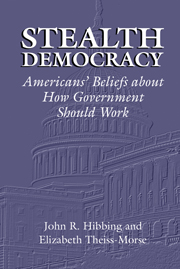Book contents
- Frontmatter
- Contents
- List of Figures
- List of Tables
- Acknowledgments
- Introduction
- PART I THE BENEFITS OF STUDYING THE PROCESSES PEOPLE WANT
- PART II THE PROCESSES PEOPLE WANT
- PART III SHOULD PEOPLE BE GIVEN THE PROCESSES THEY WANT?
- 7 Popular Deliberation and Group Involvement in Theory
- 8 The Realities of Popular Deliberation and Group Involvement
- 9 Improving Government and People's Attitudes toward It
- Epilogue
- Appendix A
- Appendix B
- References
- Index
- Titles in the series
8 - The Realities of Popular Deliberation and Group Involvement
Published online by Cambridge University Press: 23 November 2009
- Frontmatter
- Contents
- List of Figures
- List of Tables
- Acknowledgments
- Introduction
- PART I THE BENEFITS OF STUDYING THE PROCESSES PEOPLE WANT
- PART II THE PROCESSES PEOPLE WANT
- PART III SHOULD PEOPLE BE GIVEN THE PROCESSES THEY WANT?
- 7 Popular Deliberation and Group Involvement in Theory
- 8 The Realities of Popular Deliberation and Group Involvement
- 9 Improving Government and People's Attitudes toward It
- Epilogue
- Appendix A
- Appendix B
- References
- Index
- Titles in the series
Summary
The fact that there are many forms of democracy means there are numerous ways for the people to be involved in politics. Political theorists believe people would enjoy politics if only the system would allow them to get involved in an appealing political forum. Theorists further believe the political system would be improved if people played an active role in the consideration of various policy proposals – if people would get together and work collectively on matters, discussing them, learning from each other, and striving for a common goal. Only then, theorists argue, will people learn to trust each other, to appreciate the needs of other people, to care about politics, and to trust the government. Two very different strategies have been advocated for facilitating the needed interaction with other individuals: getting people more involved in self-selected, volunteer groups and creating environments in which diverse people are brought together to deliberate on policy matters.
In contrast to theorists' speculations, the results presented in Part II indicate to us that people's dislike of politics runs deep and is unlikely to be eliminated if they would only get involved with other people in political procedures. Some people react negatively to any political dispute. Many more believe politics is largely unnecessary, since they are convinced there is a popular consensus on important national goals and do not care about the specific means used to achieve those goals. People get upset with government because politicians spend too much time on unimportant matters, not because politicians vote down issues about which people care.
- Type
- Chapter
- Information
- Stealth DemocracyAmericans' Beliefs About How Government Should Work, pp. 183 - 208Publisher: Cambridge University PressPrint publication year: 2002



